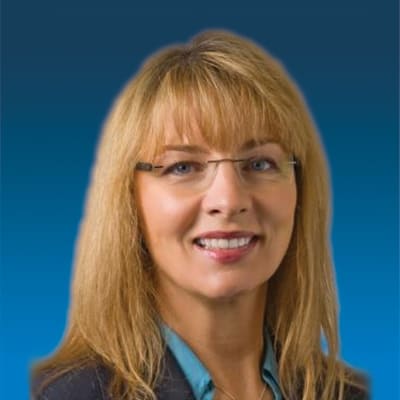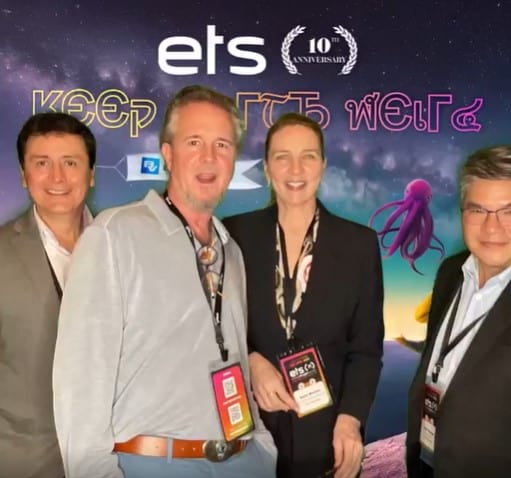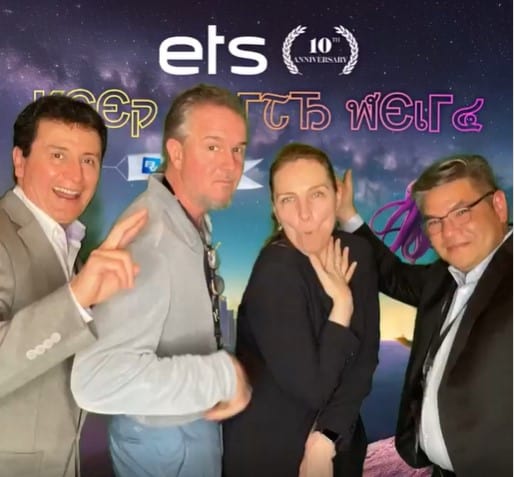
The 2023 Energy Thought Summit (ETS23) was organized by Zpryme and hosted by several industry sponsors, including PSC Consulting. The ETS23 theme, “KEEP EARTH WEIRD,” welcomed all our weirdness and kept people at the center of the energy transition conversation as the summit celebrated its 10th anniversary.
People first
During ETS23, most speakers addressed the opportunity to elevate energy equity as an outcome that can’t get lost in the clean energy transition. We have the chance to remedy existing energy injustice while transitioning to a clean energy future. Putting all electricity consumers at the forefront (i.e., a people-first approach) is necessary to ensure our future energy system delivers benefits and shares burdens more fairly than it did before.
What makes us weird?

L-R PSC’s Daniel Leon, Rob Fairchild, Gayle Wooster, Kevin Cheung
As humans we can put our heads together to create something greater than what an individual can do alone. We went to the moon, right? Well, it’s definitely going to take a ‘moon shot’ approach to decarbonize electricity and electrify everything. It is feasible to get there, but unlike going to the moon, we need to change human behavior to succeed.
If ‘weird’ equals ‘very unusual,’ and we agree going to the moon was a ‘very unusual’ pursuit, then the question really is, “Do we have the collective will to be weird — weird enough to change?”
In the historically conservative energy industry, ‘weird’ has not always been welcome. The weird kind of change has typically been in conflict with the utility’s reliable, safe, and efficient mantra. Change is equated with disruption, uncertainty, and risk, and that’s not good when your goal is keeping the lights on.
What motivates us?
Unfortunately, big failures ignite change. In terms of the grid, we have had a reactionary past. Major storms focus us on resiliency. Social justice issues focus us on Environmental, Social and Governance (ESG) topics. Significant outages focus us on regulatory change.
In general, we need to become more proactive. We can’t wait to be forced into action. We need to value progress over perfection. We need to get comfortable with a mindset of positioning failure as an expectation. Not grid failure, but trying new things in a ‘safe’ environment.
One ETS23 speaker referenced a quote from Bill Gates, “We always overestimate the change that will occur in the next two years and underestimate the change that will occur in the next ten. Don’t let yourself be lulled into inaction.”
Solving complex problems
When solving complex problems, we can become uber-focused on the results (e.g., a 100% clean grid by 2035 and net-zero carbon emissions by 2050). Consequently, we tend to concentrate on what ought to be instead of on the gap between the current situation and the desired outcome.
Decarbonizing electricity is technically feasible but presents more complicated issues than getting to the moon. The good news is that we know how to solve complex problems. As humans, we have the capacity “to acquire knowledge from others and use that communal store of experience to devise novel solutions to life’s challenges.”[i]
During ETS23, I repeatedly heard about the many facets of the energy transition. Some of the complexities included: new sectors electrifying, cyber and physical security, energy equity, extreme weather, new technologies, pace of change, interconnection requests from generation and load, a different kind of generation (loss of inertia), regulatory issues, ad nauseum.
To me, the concept of resiliency might be one of the biggest challenges. I don’t mean resiliency of the grid, per se, – although that is certainly a major challenge especially as extreme weather events increase – but resiliency in terms of facing the future while managing the realities of the existing construct. For a massive, mission-critical machine like the U.S. grid, upgrading the entire system while maintaining service reliability is a complex problem indeed.
Imagine you have a 3-bedroom ranch-style house and want to live in a split-level. The simple solution is to find a split-level house and move. Or find a contractor to build a split-level for you to move into once it’s completed. But what if you had to build the split-level as an add-on to your existing ranch house? Now imagine the complexity of adding on to your house while keeping the original space livable the entire time. The mission-critical nature of electricity service and the inherent physics and fragility of the power grid itself makes evolving into a modern grid irrevocably complex.
Is the juice worth the squeeze?
We know it will take a boatload of collaboration, huge investments, and a push beyond our comfort zones to be proactive and disruptive at a pace we’re not used to. Is the juice really worth the squeeze? Meaning, is the energy transition worth all the cost, risk, and effort?
The answer: The alternative is not an option.
The costs of unabated climate change will be much higher. So, we’re better off hunkering down and getting to the business of changing so that one day others will reap the benefits and “enjoy the juice” of the work we’ve started.

L-R PSC’s Daniel Leon, Rob Fairchild, Gayle Wooster, Kevin Cheung
If not us weirdos, then who?
ETS23 inspired me! Even with the amount of work ahead of us, plenty of ‘weirdos’ are around to push forward and keep the momentum strong. After participating in this conference, I am unconcerned about the possibility of “all thrust and no vector,” as one speaker alluded to. We are not just busy; we are achieving results. Literally every utility speaker shared their own successes on the road to zero carbon emissions.
From Emeka Anyanwu, Energy Innovation & Resources Officer of Seattle City Light, getting awarded as the 2023 ETS Thought Leader of the Year, the DoE hosting the EnergyTech University Prize competition, and Zpryme signing the Blue Planet Alliance partnership pledge (MoU) to “Create a world in which humanity and nature live in harmony,” the future is filled with optimism and opportunity to achieve great, weird things for the betterment of ourselves today and for generations to come.
[i] https://www.scientificamerican.com/article/what-made-us-unique/
